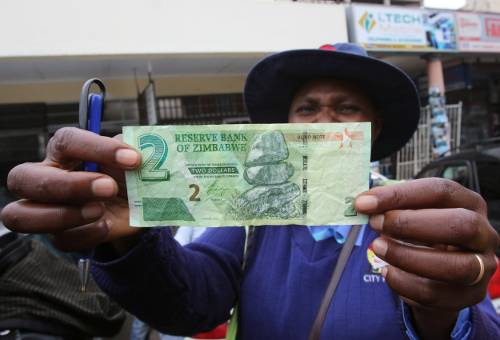Zimbabwe replaces dollar with new gold-backed currency ZiG

TLDR
- Zimbabwe introduces new currency ZiG to replace battered dollar, backed by foreign currencies, gold, and other precious metals.
- Banks mandated to convert all Zimbabwean dollar balances to ZiG; denominations include ZW$1, ZW$2, ZW$5, ZW$10, etc.
- ZiG introduced to stabilize currency and tackle economic issues; Mushayavanhu's strategic move to address long-term crises.
Zimbabwe has unveiled a new currency, the ZiG, replacing the battered dollar. The new currency is backed by a basket that includes foreign currencies, gold, and other precious metals, according to the new central bank Governor, John Mushayavanhu.
Under the new currency system, banks are required to convert all their Zimbabwean dollar balances into ZiG. The denominations of the ZiG will be similar to those of other fiat currencies, with values such as ZW$1, ZW$2, ZW$5, ZW$10, and others.
This transition comes as a replacement for the bond notes, which have experienced a significant decline since 2019. The introduction of the ZiG aims to stabilize the currency and address the ongoing economic challenges faced by Zimbabwe. This move signifies Mushayavanhu's first step in addressing one of the country's longstanding crises.
Key Takeaways
Zimbabwe's currency woes, spanning over two decades, trace back to the Black Friday of November 17, 1997. The crash of the Zimbabwe dollar, losing 72% of its value against the US dollar due to unbudgeted compensation to war veterans, triggered an enduring economic collapse. Despite attempts to revive the currency, including its official reintroduction in June 2019, confidence remained low. Previously abandoned in 2009 due to hyperinflation exceeding 500 billion percent, the Zimbabwe dollar's recent reintroduction faced skepticism. The government mandated its use alongside a brief ban on foreign currency. However, widespread distrust, stemming from past economic turmoil, persists among businesses and the public, casting doubts on the currency's sustainability.

Next Frontier
Stay up to date on major news and events in African markets. Delivered weekly.
Pulse54
UDeep-dives into what’s old and new in Africa’s investment landscape. Delivered twice monthly.
Events
Sign up to stay informed about our regular webinars, product launches, and exhibitions.




